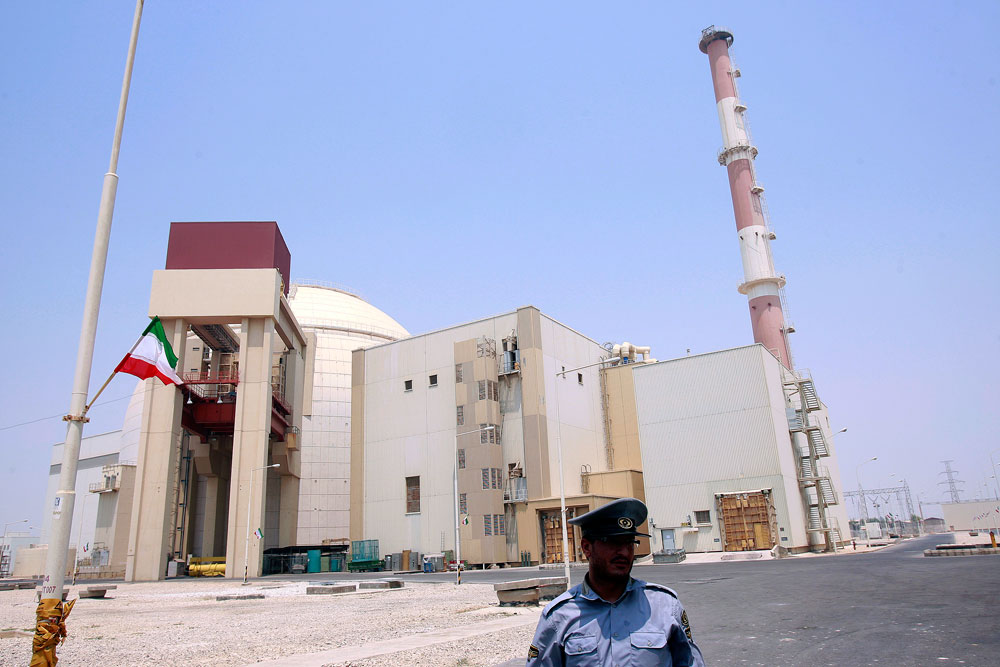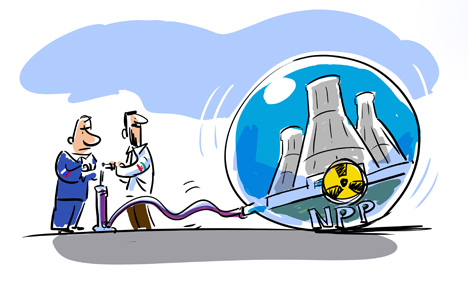Fight to develop Iran's nuclear energy heats up

A security official stands in front of the Bushehr nuclear reactor, 746 miles south of Tehran, Aug. 21, 2010.
ReutersIn January this year the UN, the U.S. and the EU lifted economic and financial sanctions from Iran. Consequently, one of the largest markets in the Middle East was reopened and many important companies throughout the world have already announced their plans to do business with Iran, including with the country's nuclear energy sector.
Spokesman for the Atomic Energy Organization of Iran (AEOI) Behrouz Kamalvandi said at the time that if Western countries were able to provide the necessary investments, Iran would be capable of simultaneously building seven or eight nuclear power plants on its territory.
Who is fighting for the Iranian energy market?
At the end of January it was revealed that Iran and Spain had already prepared a preliminary agreement to build two nuclear power plants.
"Based on these projects, the discussion of which is in the final stage, Iran and Spain will collaborate in the fields of power stations, in increasing their potential and in the formation of personnel," the Islamic Republic News Agency cites Kamalvandi as saying.
Meanwhile, back in the second half of 2015, AEOI’s head, Ali Akbar Salehi, stated that Beijing and Tehran had agreed that China would build two nuclear power plants on Iran's southern coast.
"Today a whole series of countries is trying to actively enter Iran's nuclear market, in particular South Korea, which is promoting its SMART reactor (System-integrated Modular Advanced Reactor) on the world market," said Simon Dragalsky, general director of the Russian Union of Energy Efficiency.
Seoul is ready to develop its collaboration with Tehran in the construction of small and large nuclear reactors, the production of modern equipment for nuclear medicine and in other fields of peaceful use of nuclear technologies.
However, it seems that Iran is banking on cooperation with Russian nuclear companies. On Jan. 22 Ali Akbar Salehi openly said that Russia would have privileges in respect to other countries, according to the Islamic Republic News Agency.
"In the past only Russia collaborated with Iran in the construction of nuclear power plants, while now many countries are open to cooperation," said Salehi. The AEOI head also underlined that Iran "will never forget the help and support that Russia offered it in difficult times. Russia was a friend, an ally in hard times."
However, Dragalsky sees a rational approach in this statement: "Only Russia has the most modern and authoritative "Three Plus" generation nuclear power unit," he said. "And Iran needs advanced technologies as soon as possible. Due to the sanctions the country has lost a lot of time and can't wait anymore.”
Russia establishes itself in the Middle East
Russia's nuclear technologies are not new to the Middle East region. The nuclear research reactors located in Iraq, Egypt, Libya, Syria and Algeria were built during the Soviet period in the 1960s-1970s. Many nuclear specialists in those countries had studied in Soviet scientific and research institutes.
Russia’s state nuclear agency Rosatom built a nuclear power plant in Bushehr with a capacity of 1,000 MW, which started operating in 2013.
In fact, the first Iranian nuclear power plant became the most complex nuclear engineering project in all the history of nuclear power plant construction: The Russians basically finished an abandoned project that was begun by German experts.
In essence, Rosatom integrated Russian technological equipment with German-designed constructions, adding 12,000 tons of German equipment to the Russian project.
The Busher nuclear power plant was the winner of the 2014 Project of the Year competition conducted by the oldest energy magazine in the world, Power Engineering (U.S.).
Independent Russian experts believe that competitors will find it difficult to fight Rosatom on the Iranian market.
"Despite the enormous pressure placed by the sanctions, Russia was able to construct the most modern nuclear plant for Iran, not only fulfilling all its obligations before its partner but also not violating any of the demands established by the world community. Tehran's trust in Russia after the launch of the Busher nuclear power plant is unconditional," said independent nuclear expert Alexander Uvarov.
The proof of this trust is the bilateral agreement signed in 2014 to build eight power units, including the contract to erect two new units at the Bushehr platform.
Talks are currently being held on the details of realizing the second stage of the Bushehr plant. Since the beginning of 2016 about 50 Russian specialists have been working on the project.
Russian nuclear experts are also ready to cooperate in non-energy fields such as radiation technologies, including the radiation of agricultural production and modified materials.
“These technologies are already being used successfully in Asia, Europe, the U.S. and can be relevant for Iran," said Uvarov.
Subscribe to get the hand picked best stories every week
All rights reserved by Rossiyskaya Gazeta.
Subscribe
to our newsletter!
Get the week's best stories straight to your inbox

